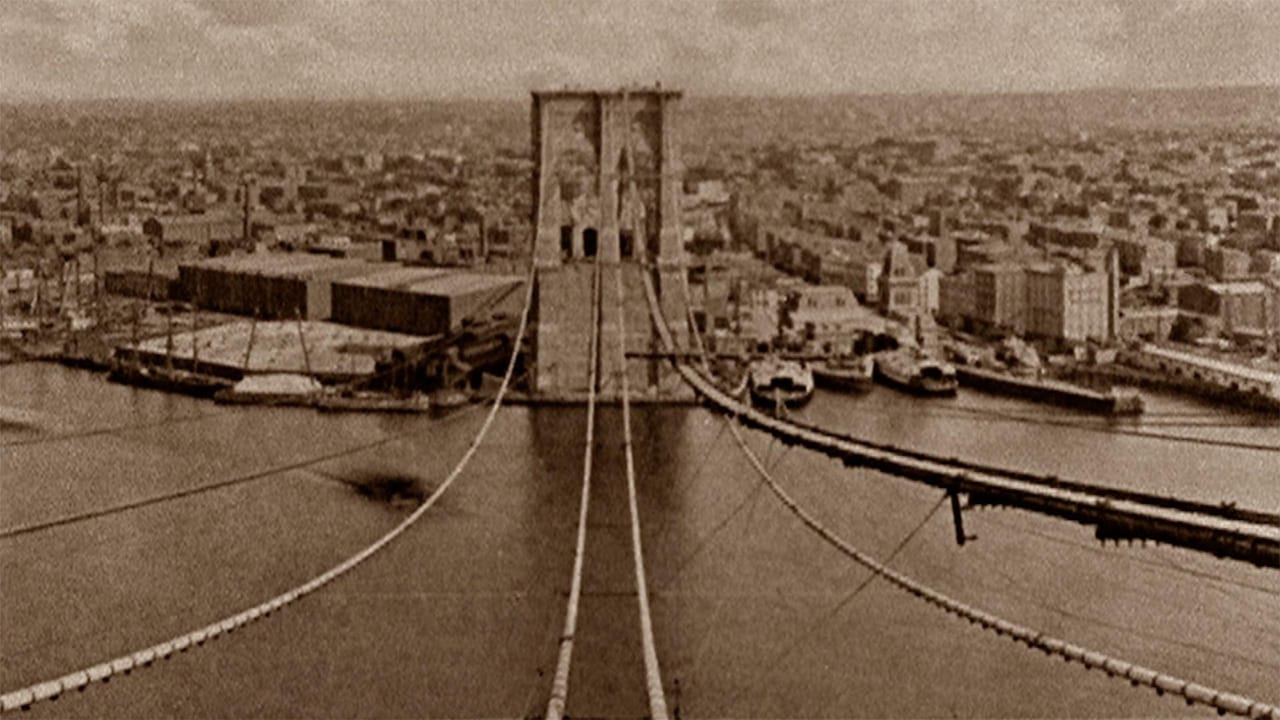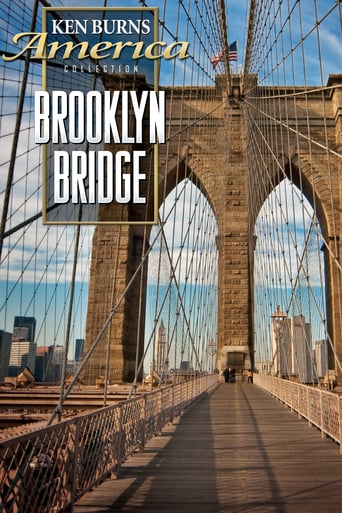Protraph
Lack of good storyline.
Contentar
Best movie of this year hands down!
MoPoshy
Absolutely brilliant
Huievest
Instead, you get a movie that's enjoyable enough, but leaves you feeling like it could have been much, much more.
tieman64
Ken Burns directs "Brooklyn Bridge", a wonderful documentary about the aforementioned bridge's construction and historical impact. It was Burns' directorial debut.Though one of the most well known documentary filmmakers, Burns often faces criticism for the overly sentimental, overly wistful, overly romantic tone of his pictures. But this romanticism perfectly suits "Brooklyn Bridge". A hymn to engineers (John and Washington Roebling), artists, workers and the "human spirit" itself, Burns turns Brooklyn's bridge into a giant metaphor: a symbol for man's fondness for setting goalposts and then moving one step beyond.All of Burns' documentaries simultaneously and superficially draw from history, science, philosophy, metaphysics, poetry and fiction. In "Brooklyn Bridge" we're bombarded with quotes from famous artists, writers, critics and architects. They praise the bridge's neo-Gothic archways, her monumental towers and the sheer willpower that sustained her construction.Eventually, though, "Brooklyn Bridge" becomes bogged down with platitudes. It also fails to seek out the feelings of contemporary New Yorkers and those who live in the shadows of the structure. Is everyone really so fond of the building? Burns' gauzy glorification is offset by several grim subplots: John and Washington Roebling meet sad fates, and the perils of caissons, watertight retaining structures responsible for their own diseases, are detailed. The film was narrated by historian David McCullough.8/10 – Interesting.
Michael_Elliott
Brooklyn Bridge (1981) *** 1/2 (out of 4) Ken Burns' first documentary takes a look at the history of the Brooklyn Bridge. We follow it's progress from the mind of Roebling who would have his son complete it, open it on May 24, 1883 and along the way we hear about the blood and tears that went into it. The second portion of the documentary takes a look at the bridge in current times and we get clips from movies, pictures and paintings that feature the famous landmark. At just 58-minutes there's certainly nothing ground-breaking about this documentary but I think it does a pretty good job at going through the history of the bridge as well as the impact it has had on certain people. I don't think there's any doubt that the most entertaining stuff is during the first half when we hear about how the bridge idea came to be and we also get to see how other bridges were being built at the time. Some of the most fascinating stuff comes from the creation of the caissons, how they were constructed and what their final purpose was going to be. This led to a disease, which became known as the Caisson Disease and we also hear about the day the bridge opened and who got to go across first. Fans of history will most certainly want to check this film out because the storytelling is extremely good and we also get all sorts of photos of the bridge as well as newspaper clippings from the days when it was being built.
MartinHafer
It seems quite fitting that this Ken Burns documentary was narrated by the historian, David McCullough. That's because McCullough has written a book detailing exactly what you'll see in this PBS film--the building of the Brooklyn Bridge.Speaking of Ken Burns, this film marks his first production. He directed and produced this film--a film that would lead to many amazing PBS documentaries, such as "The Civil War" and "Lewis & Clark".And, in an interesting twist, the voice for Washington Roebling (the son of the man who designed the bridge and who actually built the bridge) is provided by Paul Roebling--who I assume is a descendant of Washington Roebling, though IMDb gives no information about Paul other than a few film credits.The film is broken into two major parts. The first portion consists of the events leading up to construction of the bridge and work on the bridge itself. I agree with another poster who felt that the best part of the film was this portion. Then, once the bridge was completed, comes the final part where people wax poetical talking about the bridge and it's about the impact of the bridge on our culture. Much of this sounds like a lot of blather, actually--like heavy padding. I really wish that more time had been spent on the building of the bridge and the final portion eliminated or severely truncated. Sure, it's an impressive engineering feat for its day, but talking about it at such length just seemed unnecessary. I'd give the first portion a 9 and the final portion a 3. But, since the first portion is much longer, I think an overall score of 7 is merited.By the way, late in the film it shows the New York City skyline and the narration talks about Roebling's death in 1926. Oddly, the clip was of the city over a decade later, as you can see the swastika-bedecked dirigible flying over the city--a rather sloppy mistake. I assumed it was the Hindenburg but it could have been the Graf Zeppelin after its Nazi insignia was added.Also by the way, I watched this streaming from Netflix and the sound and action were out of sync--and watching people talking in the later portions of the film was kind of freaky! You may want to look for the DVD instead.
movieman-187
When this film delves into the history of and construction of the "East River Bridge" or what is now known as the Brooklyn Bridge, the film is masterfully constructed and endlessly fascinating. However, when Mr. Burns tries to romanticize the bridge in the present day (1981 when this film was shot), it becomes a mess, at the same time pedantic and preachy. I would highly recommend the first half of this film to anyone interested in historical documentary filmmaking, NYC history or architectural history, but the second half could be skipped by anyone save an Oscar completist (this film was nominated for best documentary feature in 1982) or the most hard core of Mr. Burns' fans.

